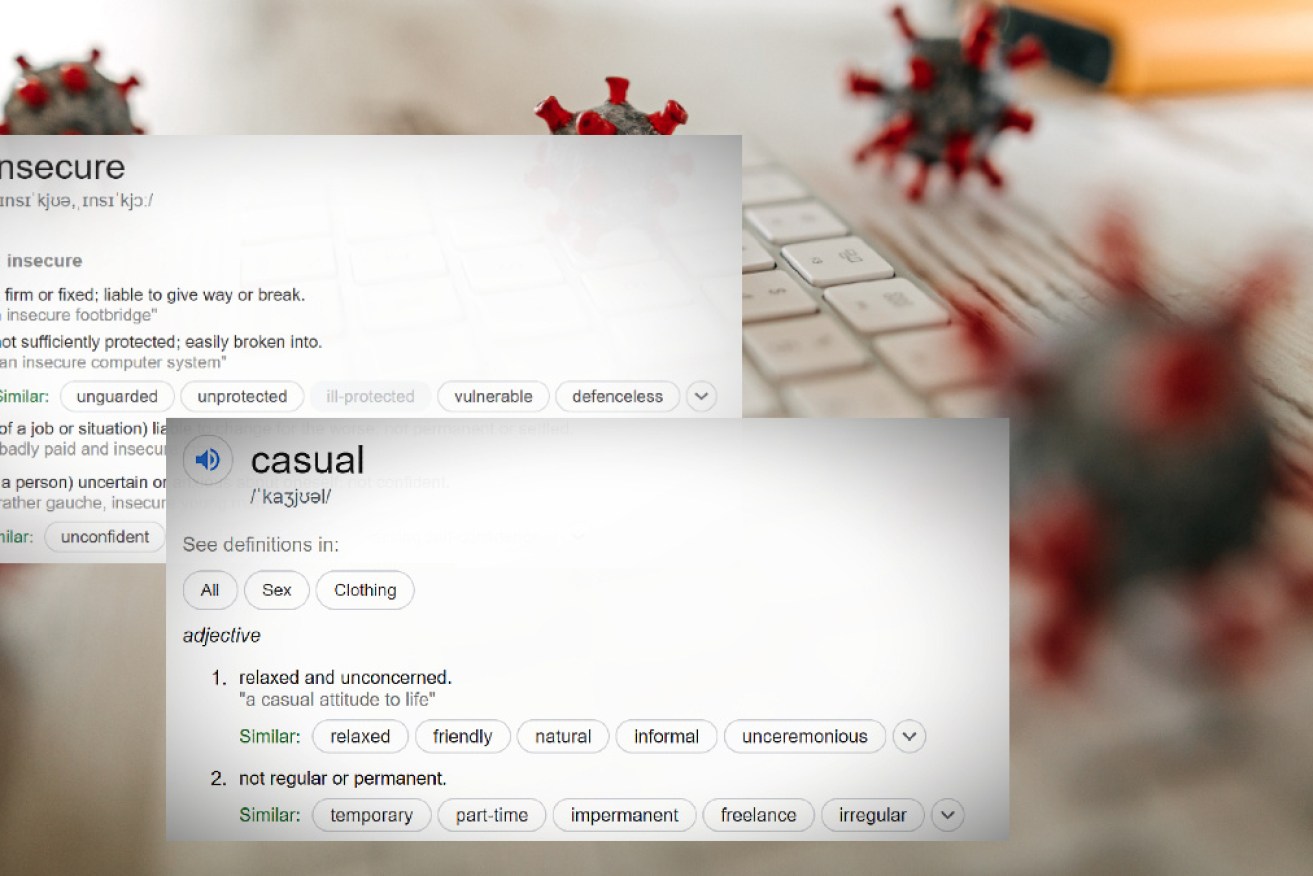A post-COVID ‘glossary’ to describe bad stuff at work


Rip up your dictionary. This glossary is much more helpful, writes Dr Jim Stanford. Photo: TND
ABC journalists are accustomed to receiving flack for their alleged bias: Usually from the right, sometimes from the left.
But one volley fired their way last week surely raised eyebrows, even among Auntie’s most thick-skinned broadcasters.
Scott Barklamb, an industrial relations lobbyist with the Australian Chamber of Commerce and Industry, tweeted a harsh complaint that the ABC dared use the term ‘insecure work’ in a news broadcast.
The mere use of that ‘weaponised’ concept, in Mr Barklamb’s view, is proof the ABC is captive to union influence (since unions have been complaining about insecure work for years).
He then cited the ABC Charter as evidence the ABC has abandoned its commitment to ‘objectivity’.
The business community would prefer the ABC to speak about ‘labour market flexibility’. That is employers’ favoured euphemism for arrangements that allow employers to hire and fire at will.
That’s much more palatable: After all, who could oppose ‘flexibility’? Except people who have been flexed out of a job.
I’m sorry did @abcnews Vic just use “insecure work” (sic) – a weaponised highly contested @unionsaustralia slogan – uncritically as an accepted term? Then give @lhilakari a free plug for a failed union claim? Charter obligation to objectivity ? @ItaButtrose #auspol
— Scott Barklamb (@ScottBarklamb) July 13, 2020
In fact, despite never-ending employer complaints about ‘rigid’ workplace rules (like that old-fashioned concept of a minimum wage), Australian workers demonstrate gymnast-calibre flexibility.
They must bend over backward to find and keep work in today’s just-in-time, dog-eat-dog labour market.
Research indicates that half of all Australian workers now experience one or more dimensions of precarious employment, including casual jobs (lacking paid sick leave and other ‘rigid’ entitlements), part-time work, marginal self-employment, labour hire positions and gigs.
In short, precarious work is the new normal across Australia’s labour market. It’s the only kind of work that young people know. Changing the terminology can’t hide the problem.
Mr Barklamb’s overreach was humorous: ‘Insecure work’ is a term that is both self-evident and very commonly used.
But there are many other bad things going down in Australian workplaces these days, all the more so given the massive disruptions in employment experienced as a result of the pandemic.
So in the spirit of Mr Barklamb’s effort to hide workplace problems by changing what we call them, we humbly present a glossary of other happy terms that he and his colleagues could use to paint a rosy hue over the grim reality of Australia’s post-COVID labour market.
1. Wage theft? Try deferred compensation
Dozens of employers have been exposed, and a few convicted, for paying workers less than the legal minimums.
But only a raging Bolshevik would dare to call this ‘theft.’ A better term is ‘deferred compensation.’
After all, employers will eventually pay that money to their workers … once government inspectors catch them in the act and order them to make backpayments (perhaps topped up with a token ‘contrition payment’).
By the way, getting caught is increasingly unlikely. The Fair Work Ombudsman has even indicated its willingness to go easy on underpaying employers because of the pandemic.
2. You say redundancy, but don’t you really mean accelerated transition?
Losing one’s job is a long-standing source of employer-friendly euphemisms.
“Good news honey, the boss says I’m not unemployed… I’ve been right-sized!” But with so many Australians losing their jobs since COVID-19 arrived, business needs new buzzwords, fast.
So we propose the slogan ‘accelerated transition’ to describe what happens when workers lose their livelihoods. After all, there’s no time like the present to start planning your next career.

Prime Minister Scott Morrison could put a few of these new terms to good use. Photo: AAP
3. We prefer entrepreneurial synergy to exploitation. Don’t you?
Yes, some corporations have profited mightily from the pandemic, and are rewarding their CEOs accordingly.
For example, Amazon’s revenues have surged 26 per cent, and CEO Jeff Bezos’s personal wealth has mushroomed by $25 billion.
Meanwhile, the company’s warehouse workers toil in robot-supervised sweatshops – now featuring the added bonus of COVID infection.
Is this unfair? Hardly. If a company can make billions by skilfully combining its capital with workers’ sweat, why should we begrudge them? Milton Friedman might call this ‘entrepreneurial synergy’, and we agree.
4. Workplace contagion is so SARS. Shared aspiration is a little more fitting
Workplaces have been among the most dangerous sites for COVID infection: Pubs, food factories, aged-care homes and migrant farm labour camps.
That kind of thing could definitely damage employers’ brands if we aren’t careful with our choice of words. But don’t worry. It’s not infection that’s occurring. Let’s call it ‘shared aspiration’.
That’s an especially useful double entendre: Since aspiration means ‘giving a go’, as well as ‘taking a breath’.
Speaking of breath, don’t hold yours waiting for journalists to put this helpful glossary into daily use. Quaintly, genuine reporters insist on describing phenomena with concrete terminology that actually describes observed reality.
But perhaps this new language of post-COVID employment relations will catch on with other media platforms.
There must be a cantankerous newspaper-owning billionaire out there somewhere who can help Australians understand that the glass of work is half full, not half empty – pandemic or no pandemic.
Dr Jim Stanford is an economist and director of the Centre for Future Work at the Australia Institute








